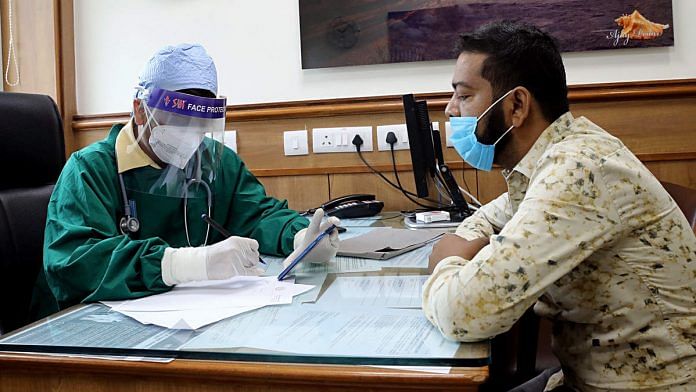New Delhi: The use of face shields along with personal protective equipment (PPE) has reduced the chances of Covid-19 infections among community health workers in India, according to a new study published in the peer-reviewed Journal of the American Medical Association (JAMA).
The study, conducted by two Chennai-based doctors — Emmanuel Bhaskar, professor of medicine at Sri Ramachandra Medical College and Research Institute, and Santhanam Arun from the Community Research Network — found “no SARS-CoV-2 infections among community health workers after the addition of face shields to their PPE”.
“The face shields may have reduced ocular (through the eyes) exposure or contamination of masks or hands, or may have diverted movement of air around the face,” said the study, published on 17 August.
However, it also highlighted that the workers’ chances of catching the virus were minimised due to their “unique living circumstances” — no contact with family, coworkers or the public. Their only possible sources of infection were asymptomatic contacts of Covid-19 patients.
“Further investigation of face shields in community settings is warranted,” the doctors concluded.
Also read: Today’s PPE kits could be tomorrow’s roads, fuel — CSIR’s plan to tackle Covid plastic surge
How the study was conducted
The study was conducted in Chennai on 62 community health workers who were assigned in May to counsel asymptomatic contacts of patients who had tested positive for the novel coronavirus.
“The health workers were housed in separate rooms of hostels and provided food; they did not visit their homes or public places outside work. Pre-work training was done with no more than three persons attending any session,” the study stated, adding that all the workers were tested for Covid-19 on 1 May, and found negative.
Each worker’s PPE kits included alcohol hand rub, three-layered surgical masks, gloves, and shoe covers. The patients’ contacts who were supposed to meet these workers were asked to wear face masks during the conversation, “although workers reported that some did not”.
On 16 May, two workers developed Covid-19 symptoms. “The remaining 60 workers were monitored, and all workers were tested for SARS-CoV-2 by RT-PCR between 16 and 19 May, and home visits suspended,” the study stated.
Then, face shields were added to their PPE kits. “On 20 May, face shields made of polyethylene terephthalate (250-μm thickness) were added to the equipment provided,” the study stated, adding that after each visit, “the shield was decontaminated using an alcohol-based solution, and at the end of the day, soaked in detergent mixed with water”.
“After the introduction of face shields, workers were screened for symptoms and had RT-PCR tests performed weekly,” it added.
Findings before and after face shields
The study then compared the number of positive test results before (3-15 May) and after (20 May-30 June) the introduction of face shields.
Without the shields, 62 workers (of which 40 were women) visited 5,880 homes and met more than 30,000 persons, of whom 222 tested positive between 4 and 13 May. Twelve workers, 19 per cent of those under the study, were infected during this period. “Eight developed symptoms and 4 were asymptomatic,” the study stated.
After the introduction of face shields, the 50 workers who were previously uninfected continued to provide counselling, visiting more than 18,000 homes, counselling over one lakh persons, around 2,700 of whom tested positive for Covid-19.
“However, no worker developed asymptomatic or symptomatic infection,” the study stated.
Also read: West Bengal prison inmates are giving protection to police, jail staff — by making masks, PPEs



